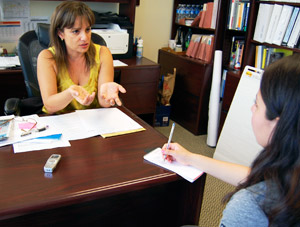Mental health Q&A

Jessica Marin interviews Pia Escudero, director of Los Angeles Unified School District’s Mental Health Services.
L.A. Youth: What are some examples of mental illness?
Pia Escudero, director of Los Angeles Unified School District’s Mental Health Services: Some of the examples that we see are depression, anxiety. We also have post-traumatic stress disorder and that’s evidenced by some of our students who see very traumatic events in the community or have frightening events happening to them. We have all sorts of more serious ones, like bipolar disorder and schizophrenia.
How common is mental illness among teens?
Escudero: By the time a student is 16 years old, about 25 percent need mental health support. Some of them are fluid, which means they can get better if they get the right help. And some of them are debilitating where they can need more [comprehensive support services].
When you said debilitating, is that bipolar disorder or schizophrenia?
Escudero: Bipolar is treatable with medication and the right support and so is schizophrenia. What happens as children and adults get older, they choose not to take medication and get the support they need … Then you see the untreated symptoms.
What causes mental illness? Is there a genetic link? Does your home situation have an effect?
Escudero: Sometimes it’s both, it depends on the illness. We know that being exposed to traumatic events can lead to certain issues such as post-traumatic stress disorder, depression, anxiety. If you see a gunfight, you go home and you start having nightmares and can’t sleep well and then you go to school and can’t concentrate and then you hear the helicopter and that’s re-traumatic. Eventually you can have anxiety or you can be depressed. The more people can ask questions: “So I’m feeling down, what counseling services are there?” the better it will be.
At what point should someone seek help?
Escudero: At any time. If they have questions or they’ve had an incident or they have a question about a friend. I think seeking help should be part of everyday life. Find out if the nurse is available or a teacher. If they don’t have anybody at their school, there are hotlines, web-based support. [See Where to Turn at the bottom of the page.]
What should I do if a friend says they have a mental illness?
Escudero: I think you need to listen carefully and try to see what that means, what kind of mental illness. And do things to protect her, which may mean getting her to the right help or telling her parents. Sometimes you don’t have the answers so … find an adult, if it’s in the school, maybe in church, but connect her to someone and you can go with her.
What if your friend tells you to keep it a secret?
Escudero: You can say, “I’ll try to keep it a secret but if I need to get the right help because I can’t help you, I’m going to get it.” When you have a feeling that this person is at risk or that someone is going to get hurt by that person, you have a responsibility to try to prevent them [from doing something].
—Jessica Marin, 18, Culver City HS
l
Where to turn
If you are feeling depressed or having any kind of mental health problem and need someone to talk to, there is help. Counseling and other services are available. To find them:
Dial 2-1-1 to find social services in Los Angeles County, including counseling and mental health centers. Or search online at www.healthycity.org.
Call Teen Line at 1-800-TLC-TEEN (1-800-852-8336) to speak with a trained teen peer counselor from 6 to 10 p.m. or go to www.teenlineonline.org.
Call 1-877-7CRISIS (1-877-727-4747), an anonymous 24-hour suicide prevention hotline.
Call the California Youth Crisis Line at 1-800-843-5200 to get phone counseling, information and referrals. Or go to www.youthcrisisline.org to chat with counselors on Tuesdays from 4:30 to 10 p.m.
Call the Trevor Lifeline for gay and lesbian youth at 1-866-4U-TREVOR (1-866-488-7386) or go to www.thetrevorproject.org.
Go to the ReachOut forums, a website for people ages 14-25 to talk about what’s on their mind, at www.ReachOutHere.com.
ll
This special package is funded by the Mental Health Services Act, Prop. 63
Opening my mind. Melissa learned not to judge people who have been diagnosed with mental illness.
Think before you speak. Phrases like “stop acting bipolar” and “that’s so OCD” are insensitive.




